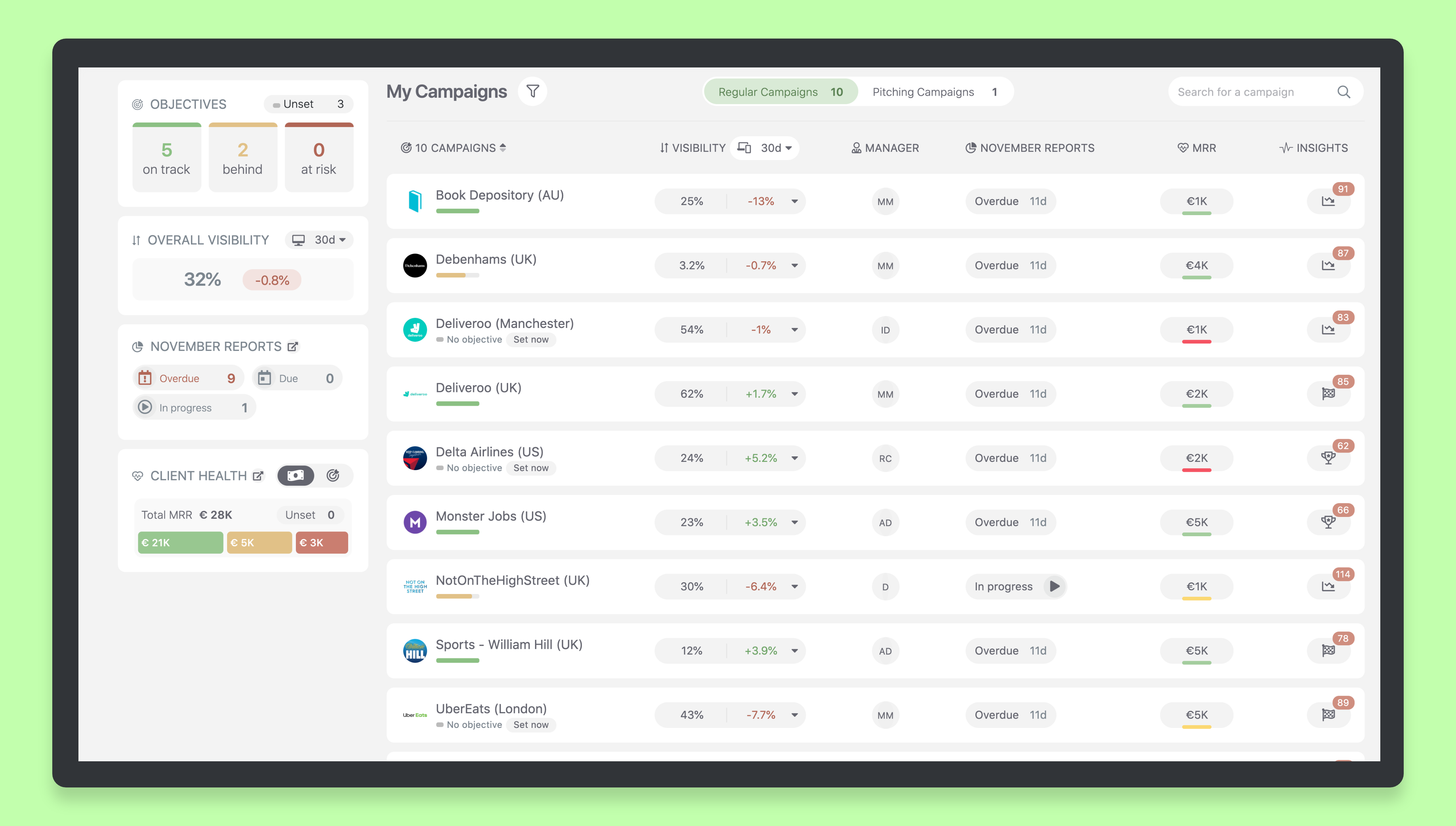Employee churn is costly, a toll on resources, and unavoidable for SEO agencies – or is it?
Picture this:
You’ve just spent a good two months prospecting for new hires in the Wild West (that is, LinkedIn and online job boards).
Then, after going through a couple of lackluster interviews, you finally find an SEO professional with the right skills for the job. The next three months are all about onboarding and training.
Six months pass and, suddenly, you have to start all over again. And it isn’t because your choice turned out to be bad for the job, yet something was missing.
Meanwhile, you’ve invested a lot of resources, and you’re left with a hard gap to fix.
SEO agencies (and digital agencies in general) have a significantly higher churn rate when it comes to employees. And an effective hiring process isn’t just about choosing the people who have the right skills for the job.
It’s also about something harder to grasp or measure – alignment.
Culture fit, or the lack thereof, has a real impact on employee turnover.
According to the Society for Human Resource Management, turnover due to poor culture fit can cost you as much as 50-60% of a departing employee’s annual salary.
That means you shouldn’t hire without culture fit as a key focus area.
We spoke with agency leaders from SEO Works and 3WhiteHats to get their insights into how you can test for cultural fit during the hiring process, instill company values in new employees, and ultimately reduce churn for your agency.
How Do You Identify Culture Fit In Candidates?
“Someone can be the best SEO in the world, but if they’re not going to gel with the team, then it all falls apart pretty quickly. It’s incredibly fragile,” says Tom Telford, Managing Director of 3WhiteHats, pointing to the main attributes that define a “culture” – common values, mindsets, visions.
The accelerating digital landscape and remote-first environments have brought new challenges for recruiters, making it more difficult to assess a candidate’s cultural fit. Meanwhile, agencies are experiencing rapid growth amidst the current push for digitization, so this process is crucial for the long-term stability of their business.
While every job posting might receive in excess of 50 candidates, it’s difficult to find people with the right specialized knowledge or skills – and identify from the outset whether an applicant is a good culture fit for your company.
That’s why, as Telford adds, you need a methodology to support your recruitment process.
It Starts with Asking the Right Questions
It isn’t just about making sure someone is passionate, clever, and capable.
“We spend a lot of time making sure that’s the person we want to work and sit next to every day for the next 10 years,” Telford said.
The founders also take the time to make sure their agency is the place that person is going to want to work for the long term, too.
Telford says there are three things he looks for when assessing for cultural fit:
- Money.
- Brains.
- Love.
Knowing how a prospect sees these things in the context of the job can make all the difference between a six-month hire and a lifelong employee.
Even with a great salary, talented people will move on if they aren’t challenged (brains), or if they don’t feel fulfilled in their roles (love). And the business has to be able to support these changes, or as Telford puts it: “It’s just making people feel that they’ve got a big part in the business and influence it. That it’s part x of their life goals.”
So one of the key questions he asks is:
“What do you want your employer to do for you? How would you want us to fit around you and your career?”
This is further echoed by Silicon Valley organizational practices.
For instance, one CEO addresses this directly in his annual employee reviews. He asks employees to tell him one thing that would make their current job their dream job, whether that’s work-from-home days, a raise, or a schedule that starts a little later in the day.
But, remember, it’s never too early to ask questions like these, to help figure out whether the relationship is one that’s going to work within your culture. You need to keep asking these hard questions to maintain a healthy work relationship.
Even with a great salary, talented people will move on if they’re not challenged or don’t feel fulfilled in their agency roles.
Design Behavioral Interviews: The STAR Method
STAR, or “situation, task, action, result,” is an interviewing technique that helps you understand a prospect’s behavior in different scenarios, successfully adopted by Amazon. Each step in STAR is a question that the interviewee must answer:
- “What was the situation?”
- “What were you tasked with?”
- “What actions did you take?”
- “What was the result?”
The STAR method doesn’t just give you insight into how a prospect handles tricky situations. It also gives you a chance to ask a lot of “Why” questions and assess their values and attitudes about those situations – all-powerful identifiers of culture fit!
For instance, as an SEO agency, you can pose questions like:
- Describe a stressful situation where you had to manage client expectations regarding an “at-risk” SEO objective.
- What is a difficult decision that you had to make at work in the past 12 months?
- Tell me about a time that you managed a successful SEO campaign. What would that project look like without you?
- Talk about a time when you had to collaborate with an unfamiliar client team.
These questions, and their STAR answers, will yield much more valuable information about culture fit than generic questions like, “Are you a moral person?” or, “Do you consider yourself a team player?”
How Do You Communicate Your Agency’s Culture?
During an interview, it’s not just you, as an employer, asking questions. It’s a two-way street, where both the agency and the candidate figure out whether they’re a good fit for each other.
In some ways, it’s very much like dating! There’s the critical getting-to-know-you phase, where you identify what you have in common and where you align on important values.
And for this phase to be successful, you need to be fully transparent about your culture during your recruitment, something that our agency leaders stressed quite often.
Even better, you should consider designing a culture book that communicates your vision about business, employees’ life, values, and attitudes, etc. After all, a recruitment process doesn’t start when the job is posted.
Consider the Continuous Recruitment Approach
SEO Works’ Managing Director Ben Foster and their Head of SEO, Paul Friend, described their adoption of a “continuous recruitment” mindset, as the agency’s hiring needs extended.
Having a continuous recruitment mindset means you don’t just prepare at the moment that you need to expand your agency, but making sure that you’re always ready so that when you need to grow, you can do it fast. This is particularly important with SEO agencies whose hiring needs can be highly variable and may suddenly increase when taking on new, high-volume clients.
Here’s how they do this at SEO Works:
- They always stay in touch with people in their industry to know who to reach out to when they need to hire.
- They stay on top of job boards, LinkedIn, personal networks, and in-agency referrals all year round.
- They promote from within, evaluating their agency at every level to determine which employees are best placed on the right pathways for growth.
By having this mindset, your agency will always have a picture of the talent available in the industry and be prepared to hire quickly when the need arises.
Part of this preparedness is having flexible, scalable systems for qualifying and recruiting new hires, including a comprehensive onboarding process that’s designed to help new hires adapt to your company culture as quickly as possible.
Can You ‘Train’ Cultural Fit?
While it is theoretically possible to train certain desired behaviors, it’s not a sustainable approach as things may remain superficial or, even, deepen frustrations with time – it’s much better to focus on targeting culturally compatible employees.
However, what you can do is make it easier for new recruits to integrate with your company.
SEO Works’ onboarding process is one great example of how to do this.
It isn’t just about teaching people how to use the company’s preferred SEO tools, but showing them the specific ways that the agency uses each tool for each specific process. This ensures that new hires are already on the same page as the rest of the company when it comes to their SEO methodology.
Plus, the team designs teaching moments and materials like templates, good and bad examples of campaigns, a constant sharing culture, and even external add-ons – from live custom training sessions offered by the core SEO tools to leadership coaches for the agency’s top management.
If you don’t have an exhaustive process like this at the ready, you can also align new hires around your agency goals and activities using the OKRs framework. This adds transparency across the organization, highlights the shared business vision, and how each of the employees directly contributes to it.
These types of onboarding systems don’t just keep new hires up to speed with best practices – they also ensure that new hires further align with the company culture.
The Takeaway
Recruiting for cultural fit takes time.
You need to have regular meetings with employees, earnestly listen to candidates, and design your systems and processes to optimize for cultural fit. But, considering the time and resources that can be saved by reducing employee churn, it’s something that’s well worth the effort.
One of the best ways to ensure a cultural fit is to have a unified, consistent onboarding and training process that engages your employees and imparts them with everything they need to fit in.
At SEOmonitor, we not only provide you with a robust SEO platform – we provide on-demand, custom training, and onboarding for every role in your SEO agency so that you make the best use of our capabilities.
This is just one of the ways in which we help agencies focus on what matters.
Join us and our SEO agencies community in the journey to bring more transparency and measurability to the SEO industry.
Discover an SEO platform
dedicated to agencies!
The opinions expressed in this article are the sponsor's own.




